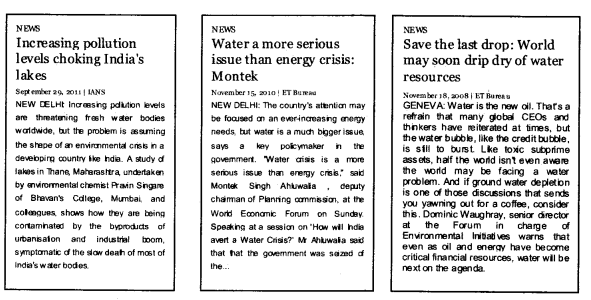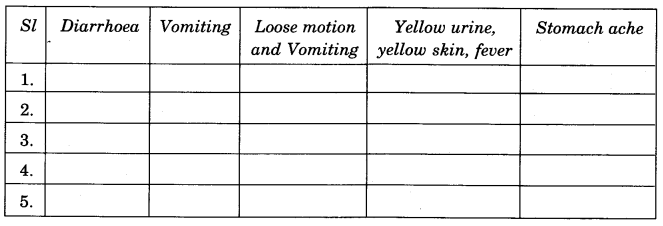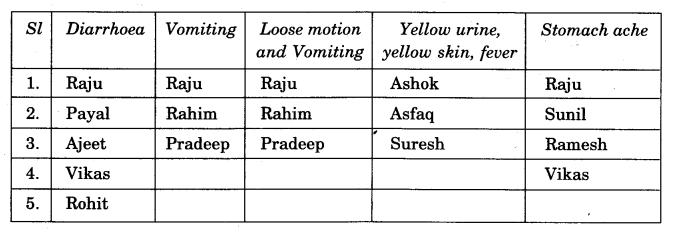NCERT Solutions for Class 4 EVS Chapter 18 Too Much Water Too Little Water
NCERT Solutions for Class 4 EVS Chapter 18 Too Much Water Too Little Water
NCERT PAGE NUMBER 147
Discuss
1.How can unclean or dirty water harm our body?
Ans. Our body can get many diseases because of dirty water.
2. Have you ever got dirty or unclean water in your area? What was the reason for
this?
Ans. Often, dirty water comes in the tap because of leakage in the pipeline.
3.Do you know anyone who has fallen sick because of such water? Talk about this.
Ans. Yes, I know some of them. One of my friends had fallen sick because of dirty and
unclean water.
4. When the guest came to Suguna’s house, they offered him a cold drink, because i they thought he should not drink such water. What do you think Suguna’s family
must be doing for their own drinking water?
Ans. Suguna’s family must be boiling and filtering the water to make it clean and
potable.
5. The guest said he did not take cold drinks. Why do you think he said this?
Ans. Cold drink may cause trouble in our body. Keeping this in mind the guest refused to take cold drinks.
NCERT PAGE NUMBER 148
Read and Write
1. Have you ever faced a shortage of water in your house? When?
Ans. We always have to face shortage of water, whenever the water supply is disrupted.
2. What did you do then?
Ans. We have to call private water tanker.
3. Have you ever played in water? Where and when?
Ans. Yes, I have played in water many times. “Whenever I went to my home at village we played in the river water.
4. Are there times when you are not allowed to play in water? What are the reasons for this?
Ans.
(a) In winter season. (b) In rainy season.
(c) When water is deep.(d) When water is dirty.
The restrictions are so that I don’t spoil my health and remain safe.
5. The water park had a lot of water to play in, but the nearby village did not have water even to drink. Discuss.
Ans. Water parks are usually run by private authorities and run for making profit. But in the village water is supplied by government. Because of poor management government often fails to supply water properly.
6. If you go to a water park, find out from where the water comes to the park.
Ans. Water comes through pipeline in the water park.
NCERT PAGE NUMBER 150
Write in Your Notebook
1. Why was Raziya worried when she read the newspaper?
Ans. Water got dirty and unclean because water from the gutter was mixed in water pipe.
2. Raziya asked that all the water that was filled the previous day should be thrown. Could this water have been used for something else? What kind of things?
Ans. Yes that water could be used for washing clothes, vehicles and for watering the plants.
3. In what way did she plan to clean the water?
Ans. She planned to boil water to make it clean.
4. Do you know of different ways to clean the water? Describe them.
Ans. Water can be cleaned by filtering and adding chlorine tablets or by adding alum, by filtering and mixing chlorine tablets.
5. Suppose, Raziya had not read the news and everyone had drunk the water without boiling it, what could have happened?
Ans. Had they drunk water without boiling then most of them could have fallen sick.
Discuss
6. Where Deepak lives, everyone has to stand in a queue to fill water from the common public tap. In Raziya’s house, water comes all day in the tap. Why is this?
Ans. Deepak lives in the slum area. In Raziya’s house water comes all the day from overhead tank.
7. Raziya read news about the water in the newspaper. Have you read any news
about water in the newspapers? What kind of news?
Ans. Yes I read news about water in newspapers. That was regarding shortage of
water, shortage of drinking water, regarding pollution of water, regarding
conservation of water, etc.
8. Look through the newspapers of the last one month. Look for all news-items related to water. Cut them out. Stick all the cuttings together on a big paper to make a big collage. Talk about what you have collected. Discuss in the class.
Ans. Do it yourself.
Some news regarding water are:

NCERT PAGE NUMBER 151
Water Survey in School
Make three groups of students in your class.
• One group will find out about the arrangements of drinking water in the school.
• The second group will find out about the arrangement of toilet in the school.
• The third group will find out about illness affecting children in the class. The questions given below will help the groups to collect information.
Group 1
Observe and Note—
1. Put a (Right) in right box or boxes
(i) Where does the water in your school come from?
![]()
Ans.
![]()
(ii) In your school, from where do you take water to drink?
![]()
Ans.
![]()
2. If there is no tap, matka or handpump, then how do you get drinking water?
Ans. We get it from water tanker.
3. Is there water in all the taps or handpumps?
Ans. Yes, there is water in all the taps and handpumps.
4. Is there any tap which is leaking or dripping?
Ans. Yes some of them are leaking. ,
5. Are all the matkas filled with water and are they covered?
Ans. Yes, all the matkas are filled with water and are covered.
6. Are the matkas and other water containers cleaned regularly?
Ans. Yes, they are cleaned regularly.
7. How is water made safe for drinking?
Ans. There is a filter attached with overhead tank besides this chlorine tablets is poured regularly in tanks.
8. Is there a long-handled ladle to take water from the matka or container? How many ladles are there?
Ans. There is one ladle for each of the matkas.
9. Is the place around the drinking water taps or container and matkas cleaned regularly?
Ans. Yes. The place around the water taps, containers and matkas are cleaned regularly.
NCERT PAGE NUMBER 153
Think and Discuss
1. Why do the drinking water places get dirty?
Ans. Water often spills during washing and taking out water.
2. What can we do to keep these places clean?
Ans. By cleaning it regularly and avoiding washing near that place.
Find out and write in your notebook
3. How often (once a day, once in two days, etc.) are the containers or matkas and ladles cleaned? Who cleans them?
Ans. Containers, matkas and ladles are cleaned once in a day. A peon cleans them.
4. How many children are there in your school? How many taps, matkas or handpumps are there? Are these sufficient for children?
Ans. There are about 1000 students in my school. There are 20 drinking water taps.
5. Who cleans the places near the water?
Ans. A peon cleans the places near the water.
6. Where does the water that is spilt go?
Ans. Water that is spilt goes to the sewer line
NCERT PAGE NUMBER 153
Group-2
Observe and note
Put a (Right) in right box or boxes
(i) What are the toilet arrangements in your school?
![]()
Ans.
![]()
(ii)How many toilets are there?
Ans. There are fifteen toilets.
(iii)Are there separate toilets for girls and boys?
![]()
Ans.
![]()
(iv)Is there water in the toilets
![]()
Ans.
![]()
(v)Where does the Water Come from?

Ans.

(vi)Is there water for washing hands near the toilet?
![]()
Ans.
![]()
(vii)Do you wash your hands after using the toilet?
![]()
Ans.
![]()
(viii) Is there any tap that is leaking or dripping?
![]()
Ans.
![]()
(ix) Are the toilets kept clean?
![]()
Ans.
![]()
NCERT PAGE NUMBER 154
Find Out and Write
1. How many boys and girls are there in your school?
![]()
Ans.
![]()
2. How many toilets are there for girls, and how many for boys?
![]()
Ans.
![]()
3. If there are no taps, who brings the water for the toilet? From where does the water have to be brought?
Ans. If there are no taps, students would bring water from handpump.
4. Who keeps the place clean?
Ans. There are peons who keep the place clean.
NCERT PAGE NUMBER 155 Talk about it
1. What can be done to keep the toilets clean?
Ans. Regular washing is necessary to keep the toilets clean.
2. What can each of us do for this?
Ans. Do not create any mess in the toilet and maintain the cleanliness.
3. Have you seen a toilet at a bus stand or railway station? How are they different from the toilet at home?
Ans. Yes, I have seen the toilet at a bus stand and railway station. As those are at public places, so, many people use them. They are less clean than the toilets in our home.
Group-3
1. Talk with the children in your class and fill in the table given below. In the last few months, how many children in the class have suffered from any of these? Write the names of the children in the correct columns

Ans.

